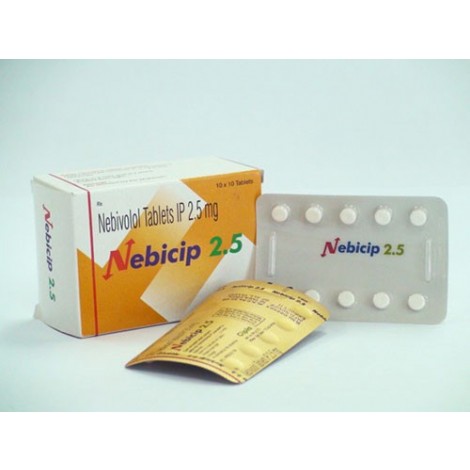Bystolic (Nebivolol)
Bystolic Information
Bystolic is a medicine which belongs to the general class of medication known as beta-blockers. These drugs are commonly used in the treatment of medical conditions associated with the circulatory system (the heart, the blood vessels and the blood flow). There are several drugs which belong in this category, and each of them has various uses and advantages.
Bystolic Indications
Bystolic is commonly employed for treating high blood pressure, as its effects on the organism involve slowing down the heart rate and causing the heart to pump out lower quantities of blood. This medicine is almost always used as part of a therapeutic program which also includes exercising, dieting and the control of the patient’s body weight. The treatment is only effective as long as the entire program is followed – as such, it is very important to always follow the routines (medication, diet and exercise) closely in order to effectively treat your hypertension.
Apart from treating hypertension, Bystolic may be prescribed for the treatment of other medical conditions which are not detailed in this medication guide. It is best to consult with your personal physician regarding the exact reason you have been prescribed a treatment course with this medicine.
Bystolic Warnings
You should never stop taking Bystolic without your personal physician’s consent. Also, once the health care specialist has decided that you should stop following the therapy, you will need to stop taking the medicine gradually – i.e. you should employ progressively decreased dosages until you are able to safely stop taking this medicine altogether. Abruptly ending your Bystolic therapy may cause several side effects, including (but not limited to): heart attack, severe chest pain and several other heart problems, or may worsen your condition.
In case you need to undergo surgery, it is strongly advised that you inform the supervising health care professional about any medication treatments you are currently following. It is possible that some of the medicines will need to be discontinued for a brief duration before and after the surgical procedure is performed.
Bystolic may have an adverse effect on your reactions or thinking capabilities; as such, it is strongly advised that you avoid any activities which would require alertness and reflexes, such as driving or operating heavy machinery.
You should consult with your personal physician prior to starting a therapy course with this drug, as several health conditions may affect your ability to effectively use this medicine. Such health conditions are liver and kidney impairment, diabetes, pheochromocytoma, thyroid affections, heart disorders (including sick sinus syndrome, heart failure, slow heart rate or heart block), emphysema, asthma or bronchitis, circulation disorders (for example Raynaud’s syndrome), recent history of heart attacks or allergies to certain substances (such as Nebivolol).
Bystolic Intake Guidelines
It is strongly advised that you closely follow your prescriber’s indications regarding the administration procedure for your Bystolic doses. If you are unsure that you have correctly understood the instructions or if you have further questions, it is best to ask your prescriber for more information.
Bystolic Dosage
The exact Bystolic dosage depends on various factors, and it is highly uncommon for two patients to require the same medication dosage. As such, it is best that you only follow your prescriber’s indications regarding the daily Bystolic dosage.
It is very common for patients suffering from hypertension to not present any symptoms at all. However, this does not mean that your condition has been cured or that you should stop taking Bystolic. Unless otherwise advised by your personal physician, continue taking the medication according to the prescription; in some cases, it is possible for the treatment to last for years, or even for the rest of the patient’s life.
Bystolic Overdose
An overdose is caused by the usage of a medicine in exceedingly larger doses, or for more time than prescribed. In the case of Bystolic, the symptoms of an overdose may include dizziness, nausea and vomiting, breathing difficulties, slow heart beat and fainting sensation.
Bystolic Missed Dose
You should always remember to take the Bystolic doses on time. However, in some situations it may not be possible to take the medicine at the scheduled time – in such cases it is best that you take the missed dose as soon as you are able to before returning to your normal administration schedule. However, if it is almost time for another Bystolic intake as previously scheduled, simply skip the missed dose and continue your normal medication routine. You should never employ a larger than normal dose in an attempt to make up for a missed dose.
Bystolic Side Effects
Several side effects have been associated with Bystolic usage, and some of these may become severe. However, it is unlikely that you will experience any adverse reaction as long as you are taking the medicine exactly as you have been prescribed. The most severe side effects include breathing difficulties, numbness or cold sensations in the extremities, swelling of the lower extremities (ankles or feet) or heartbeat irregularities (uneven or slow heartbeat).
More commonly, Bystolic may cause less severe side effects, such as tiredness, diarrhea, nausea, abdominal pain, headaches or insomnia.
Bystolic Drug Reactions
Several medicines may interact with Bystolic, including Digitalis, Reserpine, Clonidine, Guanethidine, certain antidepressants (i.e. Fluoxetine or Paroxetine), heart medication (Diltiazem, Verapamil or Nifedipine) or heart rhythm drugs (for example Propafenone, Quinidine, Procainamide, Disopyramide or Amiodarone). Also, other beta blockers (Atenolol, Timolol, Metoprolol, Propranolol, Bisoprolol or Labetalol) may influence the effects of Bystolic on the organism.


